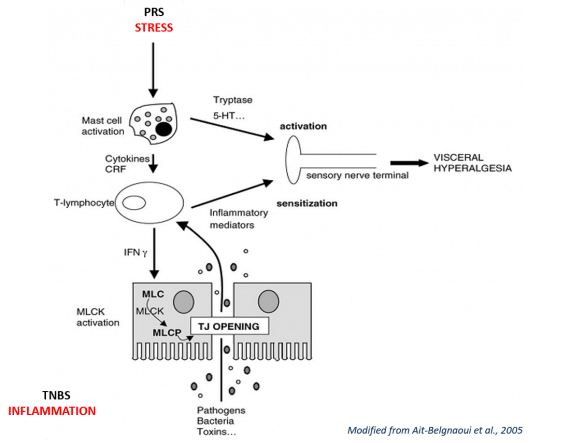Built on a back-translational approach, the preclinical visceral pain models offered at ANS Biotech are fully rooted in clinic observation.
Patients suffering from irritable bowel syndrome (IBS) demonstrate a lower visceral sensory threshold to colorectal balloon distension. Injection of trinitrobenzene sulfonic acid (TNBS) into the proximal colon mimics certain characteristics of IBS and can be used as an experimental model to explore the pathophysiological aspects of this disorder by inducing a chronic colonic hypersensitivity in the distal non-inflamed colon. This hypersensitivity is manifested in conscious rats by a decrease in pain threshold in response to colonic distension using a barostat.
Irritable bowel syndrome (IBS) is characterized by abdominal pain or discomfort and altered bowel habits. Patients suffering from IBS frequently have increased levels of anxiety or psychological distress; moreover, stressful life events have been associated with the onset or exacerbation of IBS symptoms. Preliminary results suggest that psychological stress maybe responsible for the visceral hypersensitivity to colonic distension experienced by healthy volunteers and IBS patients. Restraint stress, as a mild, non-painful, mainly psychological stressor, could trigger visceral hypersensitivity to colorectal distension (CRD) in rats. In this sense, it mimics certain characteristics of IBS and consequently, can be used as a model to experimentally explore the pathophysiological aspects of this disorder. This assay is used to investigate the ameliorative effects of compounds in partial restraint stressinduced colonic hypersensitivity.
Irritable Bowel Syndrome (IBS) is a common chronic functional bowel disease with prevalence rates from 5 to 22%. IBS is defined by the coexistence of abdominal pain or discomfort and alteration in bowel habits without obvious organic abnormalities.
The cause of IBS remains unknown, but alteration of gut microbiota, low-grade inflammation/immune activation and altered brain–gut axis might represent potential mechanisms of IBS. Many studies have focused on visceral sensitivity in IBS patients. Balloon distension of the sigmoid colon and rectum causes pain at lower volumes in IBS patients than in healthy subjects. Moreover, stressful life events are known to exacerbate/facilitate the relapse in those patients. Behavioral, autonomic and motor responses to colonic distension have also been studied at a preclinical stage.

